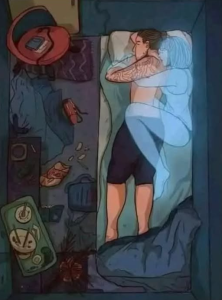
A Quiet Memory: The Moment That Still Lives Behind a Bathroom Door
There are certain places in a home that hold stories no one ever tells. Some are wrapped in laughter, some in ordinary routines, and some are locked behind silence. For me, it was the small bathroom at the end of the hallway—a place that had witnessed a moment that would quietly shape the rest of my life. It wasn’t a grand event or a tragedy splashed across headlines. It was a quiet, fragile moment. Yet it left an imprint deeper than any scar.
The bathroom itself was unremarkable. The paint on the doorframe was chipped from years of careless hands. The tiles were cracked in a few places, their edges stained by time. There was a faint smell of lavender soap that clung to the air like a memory that refused to fade. To any other person, it was just a bathroom. But to me, it was the place where the world once held its breath.
I remember that afternoon vividly. The sky outside was heavy with a rain that hadn’t yet fallen. It was the kind of day where everything felt muted, as if the world itself was holding back its emotions. I had walked down the hallway with no expectation of anything extraordinary. But when I reached the door, I heard it—an almost imperceptible sound. A soft, broken sob. The kind that doesn’t demand attention but quietly begs for someone to care.
I froze. It was my sister inside. She was always the strong one—the one who smiled the widest, laughed the loudest, and made everyone else feel okay. But that day, behind that closed door, she was unraveling. I knew it wasn’t my place to barge in. But I also knew the weight of silence. Sometimes, it crushes more than words ever could.
I gently knocked. No answer. I tried again, softer this time. The crying didn’t stop.
“Hey,” I whispered through the door. “I’m here.”
For a moment, everything was still. Then I heard a faint, cracked reply: “Go away.”
But I didn’t. I sat down on the cold hallway floor, leaning my back against the wall. I didn’t speak. I didn’t push. I just stayed. On the other side of that door, she was fighting a battle I couldn’t see. And on my side, I was quietly refusing to let her fight it alone.
Minutes passed. Maybe it was an hour. Time felt different that day. Eventually, the lock clicked softly. The door didn’t open fully—just a small gap, enough for me to see her eyes, red and swollen, the kind of eyes that had been holding back pain for far too long.
I didn’t ask what was wrong. Sometimes questions feel like sharp edges. Instead, I held out my hand. She hesitated at first, then reached for it. Her fingers were cold. But that small act—her choosing to take my hand—was a quiet kind of victory.
We sat together on the bathroom floor, the rain finally starting to fall outside. She didn’t need to explain the storm inside her. She just needed someone to anchor her through it. That day, words were useless, but presence was everything.
Years have passed since that moment. She’s moved away, built her own life, and found her strength again. The bathroom has been repainted, remodeled, and eventually sold to strangers who have no idea what it once held. But every time I walk down a quiet hallway and see a closed door, a part of me goes back. I hear that soft cry. I feel the weight of sitting on that cold floor, waiting for her to reach out.
That memory lives not in the tiles or the paint but in the silence between breaths. It taught me something profound: the most powerful acts of love often happen quietly, without applause, without the world ever knowing. It’s in the waiting. It’s in the not leaving.
There’s a strange beauty in the spaces where pain once lived. With time, they stop hurting the same way. They become soft echoes, reminders of how fragile and resilient people can be at the same time. That bathroom door was once a barrier, but it also became a bridge—a fragile, trembling connection between two people who didn’t need words to understand.
When I think of her now, I don’t see the pain in her eyes anymore. I see the strength that came after. I see the quiet courage of someone who learned to open the door, even if just a little. And I think about how sometimes, love isn’t loud. It doesn’t come in grand gestures or perfect speeches. It comes in sitting outside a door and refusing to walk away.
That moment behind the bathroom door isn’t something I talk about. It isn’t something she does either. But it lives inside both of us, in the quiet spaces of memory where the truest things often hide. It reminds me to listen more than I speak. To be present more than I try to fix. And to understand that sometimes, being there is enough.
If you’ve ever had a moment like that—a silent, invisible battle—you know how it shapes you. It’s not about the place itself. It’s about what it held. About the heartbeat on the other side of a door. About the unspoken bond that grows stronger in silence.
The bathroom at the end of the hallway is gone now, but its story isn’t. It lingers in the way I love, the way I listen, the way I stay. A quiet memory. A moment that still lives, softly, behind a door that no longer exists.

